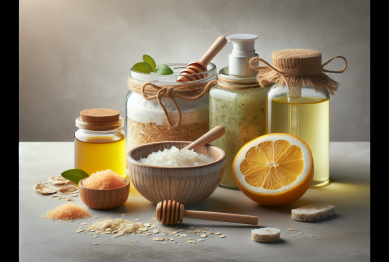Discover how collagen skincare routines may influence youthful-looking skin, hydration, and elasticity. This in-depth guide explores the role of collagen, natural strategies, ingredient insights, and what to consider before starting a routine for beauty and wellness.
Understanding Collagen’s Role in Skin Health
Collagen is often mentioned in beauty circles—but what is it really? Naturally found in the body, collagen provides essential structure to the skin. It creates that bounce and firmness associated with youthful complexions. As people age, collagen production naturally declines, often contributing to the appearance of fine lines and less plumpness in the skin. This process is influenced by several factors, both internal and external, making it a popular focus in the wellness and beauty industry. Many seek to supplement or enhance collagen’s presence in skin through specialized skincare routines, hoping to slow visible aging and encourage a vibrant appearance. The search for effective collagen skincare solutions has been growing, with more individuals exploring science-backed recommendations and product ingredients described in leading dermatological resources (https://www.ncbi.nlm.nih.gov/pmc/articles/PMC3583892/).
A deeper understanding of collagen’s structure helps clarify its reputation. Collagen is a protein made up of amino acids, and it acts as the scaffolding for skin, helping maintain strength and flexibility. Environmental factors—such as sunlight, diet, and pollution—can speed up collagen breakdown. Protecting collagen stores is a top goal for those who value skin vitality. Experts emphasize that daily choices, including sun protection and nutrition, are just as important as topical products. Using credible sources and professional guidance ensures approaches are both safe and supported by evidence.
Seeking effective ways to maintain or stimulate collagen has led to a surge in innovative skincare products. From serums to creams, ingredient transparency and product efficacy have become critical for consumers. Not all products deliver on their promises, and understanding which types of collagen enhancements are supported by science is important. Investigating labels and reviewing reputable studies can help set expectations. This approach helps minimize misinformation, empowering users to choose routines that truly align with their beauty and wellness goals.
Popular Collagen Skincare Ingredients and Their Effects
New trends in skincare often spotlight ingredients that promise to boost collagen production. Peptides, vitamin C, hyaluronic acid, and retinoids are among the most researched. Peptides, for example, are short chains of amino acids that signal skin to generate more collagen. Vitamin C helps protect existing collagen from oxidative stress and aids the skin’s own synthetic processes. Hyaluronic acid delivers moisture, making skin appear fuller and softer, though it does not directly stimulate collagen synthesis. Retinoids are also widely studied and, when used as directed, have been found to encourage natural collagen regeneration over time (https://www.ncbi.nlm.nih.gov/pmc/articles/PMC2699641/).
Understanding specific product formulations can assist in setting expectations and building an effective routine. Some individuals benefit from products that combine multiple collagen-supportive ingredients for a comprehensive approach. For example, a serum may pair peptides with antioxidants to offer synergistic effects. It’s also essential to note the importance of ingredient concentrations, as even proven substances must be present in adequate amounts to produce real results. Checking for clinical research summaries or dermatologist recommendations can provide reassurance that a product’s claims are evidence-backed. This reduces the risk of spending on less-effective solutions.
While topical treatments are popular for targeting surface-level concerns, some opt for ingestible collagen supplements. These typically come as powders, capsules, or drinks. Recent reviews from medical organizations caution that while some studies show promising outcomes, results can vary greatly based on individual skin biology and lifestyle. Furthermore, not all over-the-counter supplements are subject to the same regulations as topical skincare, making it important to evaluate safety and efficacy data before starting a new regimen. Reviewing ingredient lists and stories from reputable users helps clarify the potential benefits versus limitations of collagen supplementation for skin beauty (https://ods.od.nih.gov/factsheets/Collagen-Consumer/).
Creating a Sustainable Collagen Skincare Routine
Building a collagen-boosting regimen isn’t about chasing every new trend. Instead, a sustainable approach measures both product effectiveness and daily habits. Start with gentle cleansing, followed by application of serums rich in peptides or antioxidants. Sunscreen is essential, as sun exposure stands among the leading culprits for collagen breakdown. By layering skincare formulas thoughtfully, it’s possible to maximize each product’s benefits while supporting overall skin health. Professionals recommend consistency—results from many evidence-based routines only become noticeable after several weeks or months of regular use (https://www.aad.org/public/diseases/a-z/skin-care-basics).
Habits outside of skincare significantly affect collagen levels. Nutrition plays a crucial role—diets plentiful in vitamin C, protein, and antioxidants promote efficient collagen synthesis. Hydration matters as well, both from drinking sufficient fluids and using topical moisturizers. Sleep and stress also have an impact, as poor rest and chronic tension can interfere with the body’s ability to restore collagen overnight. Integrating healthy lifestyle choices serves as an affordable and effective enhancer to topical interventions, making this approach well-rounded and sustainable for many seeking natural beauty benefits.
Tailoring a routine is key. No single regimen fits everyone, as skin types and sensitivities differ. Patch-testing new products, starting slowly, and consulting a dermatologist for concerns can reduce risk and support informed decisions. Wellness communities and scientific publications often share case studies and progress updates, offering inspiration and realistic timelines. By balancing product knowledge with practical lifestyle steps, the journey toward more radiant, collagen-supported skin becomes both accessible and rewarding for adults of all ages.
Potential Risks and Misconceptions in Collagen Skincare
Exploring collagen skincare products comes with excitement—and occasional confusion. It’s common to encounter exaggerated promises, especially online. Risks associated with collagen supplementation include allergic reactions and inconsistent results. Experts urge caution, noting not all products are equally regulated or scientifically validated. Topical applications are often safe for most users, but oral supplements may affect people differently. It’s worth seeking out unbiased third-party lab tests where available, and reading dermatology guidance before investing in expensive items (https://www.fda.gov/consumers/consumer-updates/what-you-need-know-about-collagen-supplements).
The belief that a single ingredient provides instant or dramatic transformation is unfounded. Collagen molecules are often too large to penetrate skin deeply when applied topically. Instead, surface hydration and barrier support are the likeliest results from such products. Scientists emphasize that true collagen remodeling happens internally with the support of multiple biological pathways. Misconceptions about collagen can distract from proven wellness strategies, including nutrition, sun protection, and healthy routines which work together to maintain beauty and skin integrity over time.
Critical evaluation of marketing claims is a fundamental step. Reading beyond packaging, looking for peer-reviewed studies, and drawing on advice from trusted professionals shield consumers from disappointment and unnecessary expense. Social proof, while motivating, shouldn’t replace scientific evidence. Empowering people with accurate information ensures healthier, more realistic approaches to skincare and personal wellness. This helps shape expectations and fosters satisfaction on the journey to maintaining a glowing complexion.
Complementary Practices for Collagen Preservation and Skin Wellness
Preserving collagen relies on a holistic mindset. Beyond product use, everyday habits may offer significant benefits. Applying SPF even on cloudy days, wearing hats or sunglasses, and seeking shade protect against photoaging—the rapid breakdown of collagen caused by ultraviolet rays. Engaging in regular physical activity boosts circulation, which delivers nutrients to skin cells, optimizing their performance. Advanced techniques such as facial massage may increase blood flow and could support the delivery of active ingredients from topical products (https://www.cdc.gov/aging/publications/features/healthy-skin/index.html).
Mental and emotional wellness influences physical beauty. Chronic stress is linked to elevated cortisol, a hormone shown to accelerate skin aging and collagen loss. Practices such as mindfulness, meditation, and restorative sleep are encouraged for overall wellness. Some studies note that positive social connections and managing life’s challenges can help the body operate at its best, reinforcing skin’s potential to appear refreshed and smooth. These complementary strategies enhance and sometimes even surpass the effects of topical applications alone.
Embracing a balanced approach means staying open to new learning. Trying gentle yoga or stress-reduction exercises, exploring diverse whole foods, or even alternating skincare routines with the seasons can renew enthusiasm for holistic wellness. Listening to signals from the body and tracking changes over time helps individuals refine their practices. When combined with the most up-to-date scientific recommendations, this adaptable, multipronged approach lays the foundation for beautiful, resilient skin, supporting personal wellness goals far into the future.
References
1. Bolke, L., Schlippe, G., Gerß, J., & Voss, W. (2019). Dietary supplementation with specific collagen peptides has a body mass index–dependent beneficial effect on cellulite morphology. Skin Pharmacology and Physiology, 32(2), 76–82. Retrieved from https://www.ncbi.nlm.nih.gov/pmc/articles/PMC6380979/
2. Zague, V. (2008). A new view concerning the effects of collagen hydrolysate intake on skin properties. Archives of Dermatological Research, 300(9), 479–483. Retrieved from https://www.ncbi.nlm.nih.gov/pmc/articles/PMC3583892/
3. American Academy of Dermatology Association. (n.d.). Skin care: The basics. Retrieved from https://www.aad.org/public/diseases/a-z/skin-care-basics
4. U.S. National Library of Medicine. (n.d.). Vitamin C in dermatology. Retrieved from https://www.ncbi.nlm.nih.gov/pmc/articles/PMC2699641/
5. National Institutes of Health Office of Dietary Supplements. (n.d.). Collagen. Retrieved from https://ods.od.nih.gov/factsheets/Collagen-Consumer/
6. U.S. Food & Drug Administration. (n.d.). What You Need To Know About Collagen Supplements. Retrieved from https://www.fda.gov/consumers/consumer-updates/what-you-need-know-about-collagen-supplements









